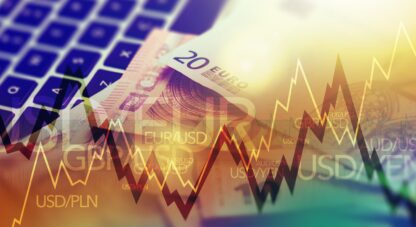Podcast: Play in new window
- We’re Borrowing To Give The Perception Of Earning
- Texas Governor Greg Abbott Has The Fortitude To Stand Against Invasion
- Gold Is Moving From Weak Hands To Strong As It Stubbornly Holds Above $2,000
“China is but one source of risk today. An upset of market expectations here in the U.S is another. We have Powell on Wednesday. We have non-farm payrolls on Friday. Likely the rate goes higher in terms of the unemployment rate—not by much, but it might suggest a directional shift. And if the directional shift is in, then we have seen the best, and that is behind us.” –David McAlvany
Kevin: Welcome to the McAlvany Weekly Commentary. I’m Kevin Orrick, along with David McAlvany.
All my life, the price of oil has been a measure of something. I remember going to San Francisco back in the 1980s. A broker hired one of us to go out. I got to be the guy to talk about the price of gold. But what he was actually doing was he was doing an analysis on how gold ties to the movement of the price of oil. And my only role was to talk about the gold side. And then he had oil guys come in and talk about the oil side. But it is interesting, Dave, because if you look at the price right now of oil, it doesn’t seem to be pointing to a lot of the things that I see in the news.
David: No, it’s not a catastrophe in the making. Of course, events keep on ratcheting up and tensions are ratcheting up in the Middle East, so this could change in the next 20 minutes.
But we look at one thing to get a perspective on something else. You want to understand inflation, you look at the Big Mac index. Today, if you go to McDonald’s, you can get an Egg McMuffin for $7.29, used to be two for two bucks. And so you say, “Well, I don’t know where inflation is because the folks at the Bureau of Labor Statistics have all kinds of games that they play. But I can tell you the Egg McMuffin just slapped me in the face.” Whether it’s the McMuffin or the Big Mac, you look at one thing to get a bead or read on something else. In the case of the stock market risk concerning World War III, or downgrade that a little bit, an expanded regional conflict in the Middle East where interested parties take sides.
Kevin: That’s a euphemism.
David: Probabilities are low, looking at the oil markets. Oil’s a barometer for such things. Equity markets are saying, “Hey, if oil’s not moving higher, if it’s not going through the roof, then we can party like it’s 1999.”
Kevin: But prices are higher by a bit. I mean, oil is rising.
David: And this month is where it’s begun to gain some traction, of course, as things have deteriorated in the Middle East, and we’ve got some things happening in the Red Sea, and oil is the barometer. So 8% higher from the beginning of the year, and that has not been enough of a move to scare out the equity speculators. They’re still willing to play freely with their leveraged positions. So there is some concern. And as we’ve witnessed in equities, these mild trends, whether it’s up or down, they can feed on themselves. So this 8% move, could it become like what we’ve seen with an equity rally? Feeding on itself as you have sort of a short-covering frenzy.
Kevin: Well, let’s talk about that a little bit because when you have people who are betting on the downside of the market, that’s called a short. And if the market goes up like in the case even of oil 8%, there is a point where those shorts have to go in and cover and buy. And it’s like a feedback loop on an amplifier, isn’t it?
David: Yeah, it is. It’s really interesting because behind the scenes, Sunday to Tuesday of this week, we’ve had massive behind-the-scenes selling of West Texas intermediate. And there is something strange going on, call it a price manipulation, but there is a will to see prices lower. Contrast that with what we see coming from the Saudis, where they basically said, “No, we’re not going to increase production as we told you we were. We’re not going to supply more to the market,” which would in essence suppress the price, bring the price lower.
Kevin: But do you think it’s politics? Do you think somebody for political reasons is wanting to keep oil very, very low for the election year?
David: It’s an election year, and the Saudis just communicated very soundly and clearly that they’re not interested in supporting the administration’s win—that, in essence, they can accommodate, and they’re not willing to. So you’ve got other things in the mix of course. And I think as you look at the really smart oil traders, they will, as soon as you have a reason for it to break considerably higher, they’ll jump on board with that. Ultimately, price reflects the balance of supply and demand, and the US supplies continue to increase. It may be gradual, but we’re pressing 13.3 million barrels per day, still rising. OPEC supplies, they’ve dialed them back, of course, but they’re capable of increasing that by at least three, four and a half million barrels per day if desired.
And so I think you look at the potential supply constraints or the disruptions, and I think the oil trader says, “Yeah, we probably have enough excess capacity to not worry about it at this point.” Traders are not in a panic. In fact, estimates of spare capacity vary. On the low side, it’s 1.8 million barrels of oil per day, as high as six and a half million. So 1.8 to 6.5.
Kevin: That’s a pretty wide spread on a daily basis.
David: And the truth’s probably closer to the middle. You think about Saudi Arabia alone, they’ve got quite a bit of spare capacity. They’re producing 9 million barrels per day, and they could max that out at about 13. Do the quick math on that. 40, 45% increase from current production.
Kevin: So what is the supply demand globally? I mean, let’s put that in perspective.
David: Yeah, they use, call it a hundred million barrels per day, and maybe we’re talking 102, 103.
Kevin: That’s demand and supply. So you’re going to be close and that’s where your price comes from.
David: It’s pretty well in balance, but you can see, if you’re using 101 million barrels per day and you’re supplying 101 million, a shift of a few million barrels in either demand or supply is what at the margins drives the price directionally. So one has to assume steady production from the U.S in order to keep a lid on prices. And of course you also have to assume sort of the generosity from OPEC+, and that’s where you’re saying no, they’re not willing to over supply the market to suppress the price. They don’t mind it inching a little higher.
Kevin: In the past, you’ve brought up the non-confirmation of the Transportation Index in the stock market, and how, if transports are dropping or not confirming and the rest of the equities are rising, that’s a non-confirmation. And you have this thing with oil and gold too, and I learned a lot actually when I went to San Francisco, I was sort of a young ‘un at that time. Don, your dad, said, “Hey, can you go give this talk? I don’t have the time.” So they didn’t hire me to do that because I was an expert at that time. But I remember going and I really learned a lot about the oil side of things. And oil does track oftentimes with gold. So I want to shift to gold for a second, because gold is really stubborn right now above 2000, Dave.
David: It has been stubborn. And before we move on past that theme of, if you look at one thing to tell you something or getting indication of something that’s actually happening elsewhere, that issue of the non-confirmation between the transports and the industrials, you can begin to see how important it is.
It’s not just a number, it’s not just a chart. There’s actually stuff that’s happening. So the fact that UPS this week lays off, what was it? 12,000 employees, and volumes in freight, if you’re looking at that from the beginning of the year to present.
Kevin: That’s railway.
David: We’re seeing decline in rail freight. That’s telling you something. It’s like the glowing report from China that the economy’s doing well, and yet they’re using half the electricity they once were. That would be an example hypothetically of an inconsistency. You’d say, “No, no, no. If the economy is booming, they would be needing more electricity.” And so you look at one thing to get an idea of what’s happening someplace else. The transports are telling you that the move in the Dow is unreal and it’s unsustainable, and this is in fact a bear market correction. Volumes and freight being down, they’re telling you something.
Kevin: Ask one of those 12,000 UPS employees as well.
David: Right. If the economy is booming, and again, this is an extraordinary period of time. We just last week had the 3.3% number for GDP, the revisions for Q3 to 4.9. And it’s all very interesting, except that what we’re really talking about is playing with debt instruments. We’re not talking about actually increasing the productive capacity of the U.S. This is not a return of strength. It’s like an increase in the tap on sugar or some external stimulant.
Kevin: Morgan just did the math on that, Dave, and he was talking about how, yeah, our GDP seems like it’s booming, but for every dollar in gain of GDP, we’re spending a buck 55 in deficit spending.
David: That’s right. So $329 billion in growth, but it took $510 billion in debt to produce it. It’s not good math. It’s not healthy math. And so you can be cheery about the headline 3.3% GDP growth. But you should be aware that freight’s coming down. Last week we talked about the leading economic indicators, 21st time in a row. It’s only been 22 times in a row where we’ve seen that number move lower. And of course you’re talking about great financial crisis timeframes for that kind of stuff. Here we are, economy seems to be soaring. Not everything adds up.
Kevin: But you’re having to spend a lot of money to make it look like it’s soaring, and that’s deficit.
David: We’re going to have some interesting insights, maybe a flinch moment. We’ll look to see if Powell blinks on Wednesday. He’s got the meeting on Wednesday. We’ve got non-farm payrolls on Friday. Two very interesting sort of event-driven things that could add some excitement to the markets. But you asked about gold, I’d say there’s some truth in the messaging found on a cross-asset basis. Gold tells a story. It tells a story about policy credibility. It tells a story about growing concerns over counterparty risk.
And we have had the opportunity for gold to break down in price, and it’s held stubbornly above 2000. Certainly it could still break down below that number, but in the extreme, if the world is soon to end, that’s when gold is telling you something. And I’m not suggesting that the world is about to end. I’m just saying that when you see a spike in price, that’s sort of knee-jerk.
Kevin: Yeah, the four G’s. Remember the four G’S? God, guns, gold, and groceries.
David: Exactly. So gold moves higher, guns start flying off the shelves, and groceries are hoarded. So again, sort of cross asset class signals can mean something. They can mean many things. Just to give you an example, the spike in gun purchases typically indicates a democratic or an anti-second amendment policy shift being on the horizon.
Kevin: That’s not every time though, is it? We had an exception here recently.
David: During Covid. Eight million purchases predominantly in blue states, presumably more of a democratic expression of angst in the context of Covid. And maybe that’s what Democrats do on the edge of the zombie apocalypse. They say— I don’t know. But again, it told you something, but not necessarily what it usually did.
Kevin: Well, groceries are still expensive. I mean, they tell us inflation’s coming under wraps, but that’s not the case at the grocery store.
David: CPI has been more accommodative, it’s come down. But you’re right, grocery prices remain stuck, in aggregate 25% higher than they were pre-Covid. And that’s at a minimum. You can find some things that are up 100% and some things that are only up 10%. And of course when it comes to groceries, you can see the price of guns go up because of demand. You can see the price of gold go up because of demand. An increase in the price of groceries is less of a function of increased demand or of hoarding and more a function of ingredient costs and inflation being passed along to the consumer because the production side is more expensive.
My daughter’s doing the science experiment where she has to see how quickly bacteria grows on bread under various conditions. In cold, in hot, in a sealed bag, in the open. And so she asked me to go buy a cheap loaf of bread, and I thought, okay, well great. Cheapest I know of is Wonder Bread.
Kevin: Right. That used to be three for a buck, I think. Something like that.
David: Yeah. Well, a loaf of Wonder Bread at our local store, not on sale last week, $4.29.
Kevin: No, that’s terrible.
David: Now, we’re talking about Wonder Bread.
Kevin: There’s no nutrition in Wonder Bread.
David: This is not ciabatta. This is not focaccia. This is not a baguette.
Kevin: Ezekiel bread.
David: This is not [unclear].
Kevin: Yeah, it’s Wonder Bread. It’s like angel food cake except for without the sugar.
David: I know. Angel food cake, you feel good because you’ve got the sugar rush.
Kevin: That’s right.
David: I think you’d probably be better off from a nutritional standpoint eating dirt.
Kevin: I can’t believe bacteria would grow in it. Anyway—
David: Well, interestingly enough, in her first round, there’s been no bacteria growing on it. And it makes me think, okay, maybe Wonder Bread is like the new Twinkie. You can put it on a shelf and it lasts forever. Forever, forever.
Kevin: So we don’t have any deflation. I mean, if groceries are 25% higher still than they were before Covid, we haven’t seen the deflation.
David: Well, and I’ve said this before, but inflation dropping does not mean deflation. Inflation dropping does not mean prices are returning to their old price levels. It means that the rate of increase is slowing. And so the inflation retreating is a little bit more like a triage doc—a doctor who gets the bleeding under control. Has it stopped yet? In the case of inflation, no.
Kevin: No, get the mop.
David: It’s just not hemorrhaging anymore. So the consumer is still in that sort of angsty place because of that. And this is really interesting, not just globally. It’s fascinating.
Kevin: Now you talk about a challenge to incumbents. As long as you keep prices down, if you can get prices down—like you said with West Texas Intermediate Crude, get that price down and make people look past the gas station and make sure that they’re paying less than three bucks a gallon. It certainly does help the incumbent, but that doesn’t take care of the rest of inflation does it?
David: Well, back to oil and the cross-asset class signaling. You’ve got Greg Abbott, picked a fight with the D.C federal government over what he categorizes as an invasion over the southern border.
Kevin: Which is what it is, yeah.
David: Judging by prominent sanctuary cities, including Chicago, now exploring an end to being a sanctuary city. This is the consequence of being a free destination for illegal immigrants, and they can’t afford it. They’re saying, “We don’t have the money. We can’t continue to pay for the social services that we have for our people, let alone expand the number of people that we’re serving.”
Kevin: And Abbott is standing up to that, and he’s speaking truth right now.
David: Strong language from Abbott. But there is a helpful data point. You had the Obama administration, which admitted that a thousand immigrants per day, was enough to break the system—which is super fascinating because now what they’re talking about in DC is a minimally improved system from then to now.
But we’re supposed to process 4,999 per day. And again, this is according to the border agreement that’s on the table this week. That sums to around 1.8 million people per year, just a little bit more than that. And so, yeah, the system is breaking, and your best evidence of that is that blue states facing budget crises are unable to deal with the immigrant influx.
Kevin: Dave, I was there when you met the now governor, Greg Abbott. And I was so impressed you were about to give a talk to our clients in the same hotel that he was talking to his people. And one of the people who was working with him knew of you, knew of your dad, knew of our company, and wanted him to meet you. And I remember, he’s in a wheelchair. I was so impressed with him as far as the way he engaged with you.
This was a man who truly believed in an idea, and it wasn’t politics. It was an idea. And I remember you guys standing there for quite a while before both of you spoke in different rooms. And the engagement that you had because he knew he was talking to somebody of like mind.
David: I’m always impressed when someone listens well, and particularly before they speak. And they ask questions and they pay attention to what you’re saying, and aren’t sort of trying to lead the conversation and move on to the next thing with their agenda. That was impressive to me.
Kevin: Yeah, he asked you questions. He wasn’t trying to talk about who he was.
David: When I think of the politician that I could support, I do think about people, not political parties. And that puts me on the wrong side of the fence sometimes with family who would say, “You’ve got to vote party line.” And I’d say, “No, actually I’m interested in the integrity of the person.” So regardless of party, here happens to be a Republican I would support with time and treasure. He’s a man regardless of party affiliation that’s interested in people over power. And I’ve met some really slimy politicians. And I’ve known lawyers that are no different, indistinguishable from blood-sucking creatures. He’s neither of those.
He was a state attorney general. He was a member of the Supreme Court before he became governor of Texas. He’s got backbone, and he’s got it. Maybe it’s supported by two steel rods, but he’s got it. You may know the story, but imagine lining up your professional life. You’re in your early twenties, you’ve already gone through your undergrad, you’re in law school. One day you go out for a run and a tree falls on you.
Kevin: Is that what happened to him? I really didn’t know this story.
David: Yeah, no, a tree falls on you. And some people would grovel and complain about bad luck. And others—and I think this is Governor Abbott—see adversity as something to overcome. Adversity does not define you. What defines you is how you respond to it. You define your response to adversity. When I think about him, you know what I hear? I see in his story a demonstration. This is a beautiful parallel to so many that want to be here in the United States. And I think this is where open arms are a good idea, particularly if you know who you’re embracing. But you’re talking about seeing adversity, not being depressed by it, but do something about it. And I see our immigrant community as our most powerful asset, not our biggest liability. Now having said that, you look at how we’re handling it and we don’t know who’s coming across the border.
We don’t know how many of them are military-aged and could be a potential threat to America. I mean, we’ve got major issues, right? But it’s how we’re processing it.
Kevin: Well, it’s controlling the flow, Dave. We’ve got a dam here for Lake Nighthorse, and if they want to release a little bit of water, they do. But if the dam were to break—this is what Greg Abbott is basically saying, the dam has broken. We have to find some way of regulating this. But Dave, he entered the fray of politics and he is fighting the fight, but he’s fighting against the federal government. Do you think what happened recently with the federal government and liquid propane, do you think that the Biden administration is actually using unfair tactics against all Texans because of Greg Abbott standing up to them?
David: I got to tell you, I’m driving into work, and I listen to a variety of things on the way to work. Sometimes it’s NPR. And this morning was NPR, and so they’re just flabbergasted. How can this man challenge the Supreme Court? What does he know about law? And I’m like, well, he was on the Supreme Court in Texas, and he was the attorney general in Texas, and a practicing lawyer. I mean, he actually does know a few things about the law.
But how does this relate to oil? Well, he says no to the federal policy on immigration. Again, akin to opening the floodgates. Five times the volumes the Obama administration admitted would break us, which I think is absolutely fascinating. And Biden immediately has a policy shift in terms of permitting for LNG plant expansion, which limits our ability to export LNG to the world. Now maybe it’s retaliation, maybe it’s not, but you’re talking about impacting a dozen future projects, and of course—this may be more to the point—there is street cred that’s built through this kind of thing with environmentalists.
Of course, Biden has to gather as many of the youth voters in as he can. So you do that by stimulating these restrictions. It’s interesting because it’s within a week’s time that you get Abbott saying no and Biden saying, “Fine, there’s not going to be any permitting for expanding the LNG plants.” Very interesting. Most of the largest companies involved in LNG exports operate out of Dallas and Houston. They’ve got some presence in California, but the majority of them headquarter and work out of Dallas and Houston. Terminals are closer to St. Charles, Louisiana. Looks and has the feel of retaliation. Two week standoff between Biden and Abbott, is Biden brandishing green credentials in the run-up to November? Because look, his approval rating certainly needs it.
Kevin: Yeah. Well, speaking of approval ratings, he’s got one of the lowest approval ratings ever of any US president. But if you look, Dave, at the world the way it is, the countries that seem to be large and well established, their leadership has virtually no approval. And then you have other countries that are growing and moving up. Look at Argentina right now. Even Argentina, you’ve got this, wow, this is a guy who may be actually speaking the truth and ready to take the shots for it. So Biden’s not the only guy with low approval ratings.
David: Well, and this is what I was getting at earlier, that there is a lingering something in not just our economy, but the global economy that has people disaffected, not excited, and really not likely to support the incumbent. Ruchir Sharma was writing in the Financial Times this week, and he was pointing out that this is in fact the record low for U.S. President approval rating late in a first term.
There was an interesting twist, though. As poorly as Biden is doing, he is still well above his peers globally. So that’s why I say there’s something going on on a broader base. Move away from the GOP or the RNC and the DNC. There’s something else going on, and it’s far more pervasive. Germany, Britain, France, Japan, you’re talking about their ratings all below 30%. Japan’s prime minister is the least popular in the world at a 21% percent approval rating. Yeah, China’s a little different.
Kevin: Yeah, you’re not allowed to say.
David: Yeah, well, you’re truly not allowed to say. If you don’t like it, if you don’t like something, you just carry a blank poster with nothing on it. That’s the only way you can speak your mind. Because to speak out or to actually have a poster board with content on it, now, wow, CCTV, gotcha. It’s time for the reeducation camp. The ones that I mentioned, Britain, Germany, France, Japan, you’re talking about developed economies. And in developing economies, you see something different. The polls in developing economies are mostly about 50% in terms of presidential approval rating.
So just think about the dynamics here. You’ve got higher growth rates and a tendency within developing economies to see a more aggressive increase in income. This is like they’re moving into their own, and maybe you’re starting off of a lower base, but you feel like your life is improving. And from one year to the next, maybe you’ve got some inflation, but you’ve got a lot of other things that are growing around you.
Kevin: So what do you think’s the difference between the growing or the developing countries and the ones that have developed and may be now stagnating?
David: Yeah, I think it’s important because it raises the question of just how impactful being an incumbent is in the developed world, and this is one of the things that Sharma talks about in his article. As recently as the early 2000s, incumbents won 70% of re-elections. Now it’s down to 30%.
What has shifted that the people in power, particularly in the developed world economies, are not that popular anymore. Something is changing in developed world economies, something is broken. And you can look at a variety of statistics. Income growth in real terms has been under pressure through the past several decades in developed world economies. And I’ll tell you what, the most recent bump in inflation has likely inflamed this low-level or subcutaneous disaffection.
Now it’s coming to the surface, and that’s regardless of the promises. That’s regardless of the pork barrel spending and regardless of the fiscal largesse. Something cynical is brewing, an assumption that entrenched leadership is corrupt leadership. And frankly, there’s some evidence of that in certain cases. And in others, I think it’s not corruption, it’s just an economic hardship which is wanting to express itself in the form of blame. So when the polls come around, when the election comes and the ballot boxes out there, isn’t it interesting that as early as the 2000s, incumbents won 70% of re-elections, now it’s down to 30%?
Kevin: That’s amazing because you always wanted to be the incumbent because that was an advantage. You had momentum. So let me restate this. There is a contrast right now between economies that are experiencing growth and those whose growth dynamics are in atrophy.
David: Yeah, developing world economies, your presidential approval ratings are all over 50%. And in developed world, the old economies which have a lot of the wealth, granted the growth is stagnating. There is a lot of wealth, but the growth is stagnating. And if you look at sort of the divide between rich and poor, if there’s growth that’s stagnating, then those who have are just fine and those who have not are going to feel the pressure at the margins, particularly when things like inflation are introduced into the equation. So you’ve got the thin dime getting thinner, and so are the social tolerances for incumbent politicians. There’s a thinning out of tolerances.
Kevin: So we talked about the politics of keeping oil low, and then we’ve also talked about the stubbornness of gold being high. Now, what’s interesting about gold, Dave, is rarely ever is gold a greed play. You talk about the difference between greed and fear. Gold is usually played not like, let’s say a cryptocurrency play, which would be more greed-oriented. Gold is typically purchased on the fear side or the concern side. Do you think that’s what’s holding gold up right now?
David: It’s interesting because gold is typically also in the dumps when stocks are reaching all-time highs. So I think there’s a wide audience of people who look at gold and say it speaks for itself. In a world full of potential missteps and policy mistakes, you should probably own some. And that’s in spite of Nvidia being at a $1.5 trillion market cap and the FAANGS having done exceptionally well this last year, getting to new all-time highs. We will see if their forward guidance— Isn’t that interesting? We’ve got forward guidance from some of the big tech companies this week. We also have forward guidance from Powell. And if the forward guidance is weak for any of them, maybe everyone looks around and has this moment of, like, “well, I thought it was going to grow infinitely. And if it’s not, maybe I should take some profits.” There’s not a lot of room.
That’s the way these markets work is it’s like a six-lane freeway getting in and it’s like a goat trail through the mountains getting out. It’s volume constrained, and that’s why you’ve got price drama on the downside. When people start liquidating, you assume that there’s someone there to buy it, and that’s any asset price seeking the bid and hitting the bid and continuing to drop from there. Your point on gold I think is really important because this idea of gold being sort of stubbornly at elevated prices within $50, $100 of its all time high while stocks are also at their all time high—
The world is full of intelligent investors and they’re judging things constantly. They’re looking at what’s happening in the Middle East and they’re saying, “Yeah, no reason to panic quite yet, but you’ll know when we do panic because the price of oil will go sky-high. You’ll know when our concerns about World War III are palpable when it becomes existential because the price of oil will pop.” And gold too. The stubbornness above 2000 is telling you that there’s a lot of investors that don’t like the backdrop, even if they are enjoying the upside. And so that’s upside in other asset classes. So a shift to gold, gold is an expression of fear probably more than greed. Oil may reflect demand dynamics tied to the global economy, or supply dynamics tied to OPEC, or tied to U.S. production or tied to temporary delivery constraints.
Again, and that’s where the Middle East features prominently. You get an event-driven pop in the price because they’re like, “No, supply is not going to be coming on the timeframe that we need it.” Gold is more of a pure play on concerns. And so there is a relationship to oil where if there’s something that’s disruptive, you’re going to see it priced in very quickly.
The concerns for gold, central bank concerns are there over the coercive hegemonic U.S. dollar system and wanting to deal with it to negotiate a way around it, to hedge against it. You’ve got investor concerns over stability. Is that stability in the equity markets or the bond markets or the currency markets? Is it political stability? Is it geopolitical stability? Is it looking particularly at peace or inflation or counterparty risk? All of these things are concerns that drive investors to look at and consider gold.
Kevin: But there are investors— there’s this group that are managed money guys, and I would say that would be the greed element, the COT—Commitment of Traders—report. That’s something that you watch because that’s an element that can buy and sell. They don’t care whether it goes up or down, or they don’t really care what they’re playing in. They just want to make sure that it’s going up or down and they’re on the right side of the trade.
David: dell, again, you get a beat on one thing by looking at something else. My wife came out, visited when I lived in Idaho, my brother-in-law and I ran a restaurant 25 years ago, 30 years ago, I don’t even remember. In the late nineties. And we had dated for a couple of years, written back and forth, but she needed to know who I was, and she knew that if she was looking at my sister and looking at my brother-in-law and spending time with me and we’re all in the room, she’d have a good idea of if this is really who I was. So she was looking at them to figure me out. Does that make sense? Was I authentic? Was I true to who I had presented myself to be?
Kevin: How do you look in context of other things? That’s right.
David: That’s exactly right. And so we talk about the COTs, and they are something that we look at to tell us about something else. The reality is, the constituents in the COTs are of a particular type. When you’re buying a futures contract, it serves a purpose, and it’s different than somebody who buys bars. I think of two investors in particular that we’ve worked with through time. A Frenchman who wanted only kilo bars, particular serial numbers, the serial numbers in a particular exact sequence, not disturbed. They need to be in the exact same sequence, stored in a safe on the East Coast that’s safe inside a double vault. The particularities, this is a guy who wanted to eliminate all forms of risk.
That’s different than somebody who’s playing in the futures market and is willing to go long futures contracts on a five to one leveraged basis.
Kevin: Or short.
David: Or short. And so we look at the COT reports to tell us about something else, and we talked about the COT reports not being particularly positive for gold at the present time. That is a contrarian read on the COT report based on who is buying, because there’s multiple categories within the COTs and it’s important to know who is buying and to what degree. So who’s buying, who’s going long, who’s going short, to what degree? When speculators— Getting specific to subcategories here, managed money in particular, managed money in the COT reports encompasses the speculative community, encompasses the hedge fund crowd. When they’re piling into gold, it’s often based on short-term opportunism.
They’re playing momentum. It’s not based on a thesis. It’s not like the Frenchman I mentioned. We worked with another family, an Indian family, who wanted to have gold stored in kilo bars in multiple locations around the world. In India, yes, in the United States, yes. In Switzerland, yes. A lot of kilo bars. That’s a different investor than someone who’s investing on the basis of short-term opportunism. This is someone who has a thesis.
Kevin: And there’s a lot of them in the room right now, and usually when a lot of the momentum players enter the room, it’s a good time for you to leave.
David: I thought you meant the two of us. A lot of us in the room. We do have a thesis. There’s a lot of us.
No, you’re right. It’s back to the point. Momentum players, when they’re absent from the COT reports we’re encouraged because of how fickle they can be. When investors, however, on the other hand, different than the momentum players, the managed money crowd, the hedge fund crowd, when investors are building positions, not on the basis of momentum, but on the basis of a broader thesis, there is an uptrend that’s far more stable. And of course managed money may step in and exaggerate that trend, but what we’ve seen in the last three, four weeks is that managed money has gone from being really enthusiastic, taking the price to 2150. And they’re kind of bored.
Kevin: That’s good, isn’t it? I mean, they’re leaving the room.
David: They’re growing bored with the precious metals, which is a positive development, and instead of a correction down in price, we’re seeing a correction sideways over a longer period of time. And that’s, to keep in mind, corrections in any asset class fall into those two categories. It either happens over time or it happens via price. Maybe we have more price correction ahead of us, but slowly through time, the correction is occurring.
It’s weeding out the fickle opportunists in favor of the stronger hands and longer-term orientation of central banks and investors that see something brewing that they don’t like. And again, you might say, “Well, why hasn’t the price collapsed?” We’ve got the dollar which is resurgent to the upside. We’ve got an equity market which is incredibly strong.
Kevin: We’ve got oil down.
David: And we’re getting ready to go into the next growth phase. And in fact, we’re talking about all the QT and all of the financial market tightening, which the Fed put into place. It’s all going to go away. Why would there be interest in gold? Well, you look at the context, and there’s good reason to be there. There’s myriad risks. Right? Myriad risks to the financial market exist. Myriad risks to a peaceful global coexistence are proliferating.
Kevin: The debt is unsustainable in the long run.
David: Myriad fiscal risks on the debt side, the fiscal risks are multiplying. They are unsustainable debts. They are not manageable in a higher interest rate environment. That’s the catch-22.
Kevin: So could it be, gold above $2000 is actually a correction?
David: Well, it’s a possibility. The price of gold has averaged over $2000 an ounce for nearly 12 weeks. A couple of those weeks it dipped lower, but again, an average. Over the last 12 weeks, it’s higher. And the drama of the mid-December move to $2150. It’s been tempered. It’s been tempered by the time spent moving sideways. I can make a case for lower prices, but as time goes by, the probability of a price decline diminishes, and the probability of another test on the upside increases. We come back to this number. It’s not a magic number, it just happens to be the point which has been sort of the glass ceiling on the price of gold for 12 years.
You close above $2100 per ounce. We’re in a new landscape. New landscape altogether. COTs are changing constantly, and we get a weekly number which is reported just once a week. So if you look back at what’s happened over the last few weeks, it’s been constructive. It’s been constructive. But I remain cautious. I remain cautious due to the metal’s ordinary seasonality. And again, you said it earlier. “On the one hand, but on the other hand.” But there are factors which are truly extraordinary. So on the one hand, we have seasonality. On the other hand, the COTs are improving over time. On the other, China’s in this crazy extraordinary place where they look a lot more like Japan at the end of a long run of success. The dream of the Chinese economy surpassing the US economy, it looks sillier by the day. But that was the talk even 24 months ago, certainly prior to Covid.
Kevin: Now they’re having to intervene just to keep things looking like they’re working.
David: China’s required over $400 billion in interventions in the last week to stabilize the equity market.
Kevin: That’s almost half a trillion dollars. That’s amazing.
David: We’re talking about the reduction in reserve requirements that created the equivalent of $140 billion in liquidity into the banking system, so liquidity in that form, and then nearly $280 billion in direct market interventions. Then you’ve got the prohibition of Chinese insurance companies from selling equities at all. They are fat to the gills, filled to the gills with equities in their portfolios.
Kevin: And you can’t sell them.
David: No, the CCP has said you’re not allowed to sell. In the U.S., we call those macro prudential tools. Whatever, sounds really good. But that’s what they’re trying to manage chaos with and through. All these measures, and it’s a combination of political measures and financial measures. The commonality over time is they’re becoming more and more muscular.
I’m just mentioning them as one of many. China is but one source of risk today. An upset of market expectations here in the U.S. is another, and we have Powell on Wednesday, we have non-farm payrolls on Friday. Likely the rate goes higher in terms of the unemployment rate, not by much, but it might suggest a directional shift. And if the directional shift is in, then we have seen the best, and that is behind us.
Kevin: Well then, I talk about market expectations. Haven’t the prices already priced in massive cuts? Many more cuts than even what Powell might mention if he were to mention any at all.
David: I find so much in life is about managing expectations, and maybe this is just a mental game that I play with myself to lower expectations so I’m rarely disappointed. Call it a coping mechanism. Look, I need counseling for many things. Maybe this is just one of them. But you look at market expectations, and when they run ahead, you know that the consequences can be that much greater. Elevated expectations when disappointed offer more severe market outcomes. And market expectations of a rate cut in March were 84% one month ago, and they have dropped to between 45% and 50% today.
Kevin: Lowering expectations.
David: But they still expect a rate cut in March. And so this week, Wednesday, when we hear from Powell, he may signal that there will be no rate cut in March, which means that there’s a bunch of people out there who will be disappointed. And what about the longer term? We still have the assumption priced into the swaps market of 135 basis point cut by December of this year, and that’s even though the Fed has only ever suggested taking rates down by 75 basis points, nearly—
Kevin: But it’s already priced in.
David: —nearly 100% difference between what the Fed has said will happen or that they think will happen and what the market expects to happen. So we’re in that place. The setup this week is pretty interesting. Maybe we get a market upset with expectations being disappointed. Powell meets this week and the markets are curious if they’re going to get balanced Powell, if they’re going to get dovish Powell or a very hawkish Powell. Probably not a hawkish Powell. Maybe a dovish Powell. Maybe a balanced Powell.
It is a fascinating setup because the markets expect some accommodation. They expect a suggestion of when the first rate cut will occur on our way to 135 basis points by December. And if it’s not on target with those expectations, even if it is in the right direction, just not to the degree, the markets are likely to move in the opposite direction. So you get accommodation, you get a reduction of rates or some promise of it. Maybe it’s in April, maybe it is in March. But if it’s not enough, guess what? Too much built into the expectation profile of the markets, it translates to more dramatic downside.
Kevin: When you meet a person who’s got high expectations for something and you’ve got a little bit more experience and you look at the environment that they’re making these comments in, you hate to pop their bubble. That’s what it’s called, Dave, is popping their bubble. When you go, “I know you have high expectations, but sometimes…”
You have to do this as a father. As a father, sometimes your kids might have high expectations, but you don’t necessarily see the possibility of that working unless there’s a big change, and you have to pop the bubble. Is that what we’re talking about here? Because let’s face it, look around you. We can’t possibly be in the kind of boom that a lot of these expectations are pointing to.
David: Yeah, I think this is where Powell would prefer to be balanced. He doesn’t want to pop the bubble. He wants the market to just moderate a bit, and he wants to thread the needle as smoothly as possible.
Kevin: Can’t we all just get along?
David: Can’t we all just get along? But the market is like that person who shows up at an evening event and they didn’t eat dinner, and they were kind of thinking that dinner was going to be served. And it doesn’t matter how—
Kevin: I’ve been there.
David: Doesn’t matter how good the hors d’oeuvres are, it’s not enough. You still have this hunger and you’re like, “Well, I guess I was hoping for more.” Needing more. That’s a dangerous place for the markets to be. You come back to gold, and it’s this perfect setup where whether it is financial market instability or geopolitical instability or just dealing with the ramifications of having too much debt—and of course we’ve got Treasury auctions this week, and it was only a few months ago that the Apollo guys were saying, “Look, it’s $7.6 trillion in debt that needs to be refunded over the next 12 months.” We’re living through a fiscal train wreck, and yet we look at market prices, particularly in the equities markets, and everything looks beautiful. Never been better. Never, never been better.
Kevin: What you’re saying is eat before you come. Eat before you get to that party.
David: Or be prepared to be disappointed.
Kevin: Exactly.
David: I think what’s shaping up, and I’ve said this multiple weeks in a row, and I guess I can’t help myself but express a little bit of unanchored bullishness on the metals. This is the year that gold breaks $2100, and as gold breaks $2100, silver plays catch up. And there are some dynamics there that are very powerful in terms of wealth generation.
But when you engage with that idea, and there is a greed aspect to it, recognize that the only reason those metals are moving is on the basis of fear. So before you get real excited, keep in mind the landscape and the context and how confusing this can become.
Kevin: Yeah, wait until you see the silver greed element hit, and we’ve seen that. About every 10 years, actually, Dave, we see silver outperform gold two to one, and that’s a wonderful opportunity for us and our clients.
David: Wouldn’t surprise me if 2024 is that year.
* * *
You’ve been listening to the McAlvany Weekly Commentary. I’m Kevin Oreck, along with David McAlvany. You can find us at mcalvany.com. And you can call us at (800) 525-9556.
This has been the McAlvany Weekly Commentary. The views expressed should not be considered to be a solicitation or a recommendation for your investment portfolio. You should consult a professional financial advisor to assess your suitability for risk and investment. Join us again next week for a new edition of the McAlvany Weekly Commentary.















